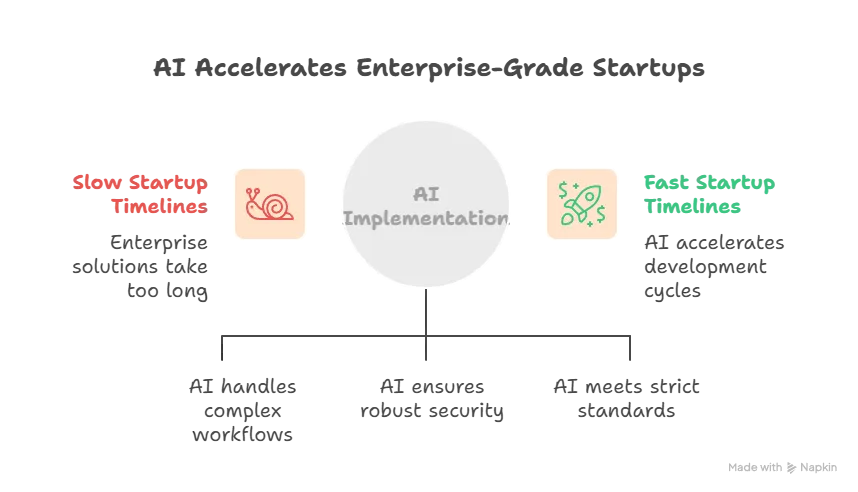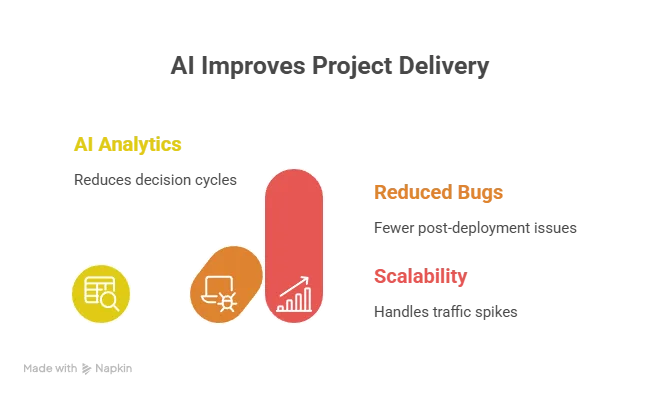In today’s fast-paced digital era, startups often struggle with a pressing challenge: delivering enterprise-grade solutions without the luxury of enterprise timelines or resources. Traditional software development cycles can take months, sometimes years, leaving startups at a disadvantage in competitive markets. In my experience working with multiple tech startups, I’ve observed that Artificial Intelligence (AI) is the game-changer that allows small teams to scale, innovate, and deliver high-quality solutions at unprecedented speeds.
This blog explores how AI helps us deliver enterprise-grade solutions on startup timelines, covering the strategies, tools, and practical applications that make it possible.
Understanding Enterprise-Grade Solutions and Startup Timelines

Before diving into AI’s role, it’s essential to define the terms:
-
Enterprise-Grade Solutions: Software or digital platforms that are scalable, secure, robust, and capable of handling complex workflows and high user loads. These solutions often follow strict compliance standards and performance benchmarks.
-
Startup Timelines: The rapid development and deployment schedules typical of startups. Unlike large organizations, startups cannot afford prolonged development cycles. Speed, agility, and efficiency are critical.
The challenge lies in balancing quality, scalability, and compliance while moving at startup speed—a task that often seems impossible without additional support. This is where AI enters the picture.
AI as the Accelerator for Enterprise-Grade Solutions
1. Automating Repetitive and Time-Consuming Tasks
One of the most immediate benefits of AI is automation. AI-powered tools can handle repetitive tasks that traditionally consume a lot of developer and QA resources, such as:
-
Code generation and code reviews
-
Test case creation and execution
-
Data entry and data cleaning
-
Routine operational processes
By automating these functions, AI allows development teams to focus on critical business logic and innovation, significantly reducing the time to market.
Example: In a recent project, we leveraged AI-driven code generation tools to create boilerplate code for microservices, cutting development time by nearly 40%.
2. Accelerating Data-Driven Decision Making
Enterprise-grade applications are often built around data insights. AI algorithms help us process massive datasets quickly, identify patterns, and make informed decisions.
-
Predictive analytics can anticipate system loads or user behavior.
-
AI-powered dashboards enable real-time monitoring and anomaly detection.
-
Natural Language Processing (NLP) helps in understanding customer feedback or support tickets efficiently.
By integrating AI into decision-making, startups can react faster and scale smarter, maintaining enterprise-level reliability without extended development cycles.
3. Enhancing Software Quality with AI-Powered Testing
Maintaining high-quality standards is non-negotiable for enterprise-grade solutions. AI assists in achieving this through:
-
Automated testing: AI can generate test scenarios and identify edge cases automatically.
-
Predictive bug detection: Machine learning models analyze historical data to predict potential failure points.
-
Continuous integration/continuous deployment (CI/CD) optimization: AI identifies the most critical updates for deployment, ensuring stability.
In my experience, integrating AI in testing reduces bug discovery time by 50%, ensuring that we meet enterprise-grade standards within startup timelines.
4. Optimizing Resource Allocation
Startups usually operate with lean teams and limited budgets. AI helps in optimal resource allocation by:
-
Predicting workloads and allocating developer or cloud resources accordingly
-
Automating deployment pipelines and server scaling
-
Forecasting customer demand to ensure system reliability
This means even with constrained resources, startups can deliver solutions that perform at enterprise standards.
5. Facilitating Rapid Prototyping and Iteration
One of the biggest advantages of AI is its ability to support rapid prototyping. AI-assisted tools can:
-
Generate wireframes, mockups, and UX prototypes
-
Simulate user interactions with predictive modeling
-
Provide instant feedback on system performance
Through rapid iterations, startups can refine solutions faster, reducing the cycle from concept to enterprise-ready deployment.
6. Enabling Scalability from Day One
AI also ensures that solutions are designed to scale from the outset. Machine learning algorithms can anticipate user growth, optimize infrastructure, and prevent bottlenecks.
For example, using AI-based load prediction, we designed an application that handled 10x expected traffic without compromising performance—something that traditional development approaches would require months to achieve.
7. Improving Customer Experience through Personalization
Enterprise-grade solutions excel at delivering personalized experiences. AI helps startups achieve this by:
-
Recommending content or products using machine learning algorithms
-
Automating customer support with AI chatbots and virtual assistants
-
Analyzing user behavior to refine features continuously
This allows startups to offer a level of sophistication comparable to enterprise competitors while still operating on a lean schedule.
8. Reducing Human Error and Compliance Risks
Compliance and regulatory adherence are critical in enterprise-grade solutions. AI assists by:
-
Monitoring transactions and activities in real-time
-
Flagging anomalies or potential compliance violations
-
Automating report generation for audits
This not only speeds up compliance-related tasks but also reduces the risk of human error, a common bottleneck in startups.
9. Integrating AI Across the Development Lifecycle
From planning to deployment, AI can touch every phase of the development lifecycle:
-
Requirement gathering: AI analyzes user stories and prioritizes features
-
Design: AI-assisted prototyping tools generate UI/UX frameworks
-
Development: AI code assistants accelerate coding and reduce errors
-
Testing: AI predicts bugs and automates regression testing
-
Deployment: AI optimizes CI/CD pipelines for efficiency
By embedding AI throughout, we can deliver enterprise-grade solutions faster, cheaper, and with higher quality.
Real-World Impact: My Experience

In several projects I’ve managed:
-
Using AI-driven analytics, we reduced decision-making cycles by 60%.
-
Implementing AI-based automated testing, we decreased post-deployment bugs by 40%.
-
Leveraging machine learning for predictive scalability, our applications could handle unforeseen spikes in user traffic seamlessly.
The bottom line: AI allowed us to deliver enterprise-grade solutions within startup timelines without compromising quality or scalability.
Challenges and Considerations
While AI is transformative, startups must consider:
-
Data dependency: AI effectiveness depends on quality data. Startups need robust data collection pipelines.
-
Initial setup cost: AI tools require upfront investment in infrastructure and training.
-
Skill requirements: Teams need expertise in AI integration, which may require hiring or training.
Despite these challenges, the long-term benefits far outweigh the costs, especially for startups aiming to compete with established enterprises.
FAQs
1. How does AI reduce software development time for startups?
AI automates repetitive tasks, generates code, predicts bugs, and optimizes workflows, reducing development cycles significantly.
2. Can startups achieve enterprise-level security using AI?
Yes. AI monitors applications in real-time, predicts vulnerabilities, and automates compliance checks, ensuring enterprise-grade security.
3. Which AI tools are best for accelerating startup development?
Tools like GitHub Copilot (AI-assisted coding), Testim (AI-powered testing), and DataRobot (AI for predictive analytics) are effective for startups.
4. Does AI integration increase operational costs for startups?
Initially, yes, but it reduces long-term costs by improving efficiency, reducing errors, and optimizing resources.
5. Can AI help in scaling applications for high traffic?
Absolutely. AI predicts traffic patterns, optimizes infrastructure, and ensures seamless scalability without downtime.
Resource Center
These aren’t just blogs – they’re bite-sized strategies for navigating a fast-moving business world. So pour yourself a cup, settle in, and discover insights that could shape your next big move.
What Industries Benefit the Most from AI Development Services?
Top Industries Transforming with AI Development Services Artificial Intelligence is no longer an experimental technology reserved for research labs. It has become a strategic growth engine across global markets. [...]
Should You Hire an In-House or Remote .NET Developer?
In today’s competitive digital ecosystem, the success of your software product often depends on one critical decision — how you hire your .NET developer. Whether you are building enterprise [...]
How Much Does It Cost to Build a Generative AI Solution?
Generative AI is no longer an experimental technology—it is a business accelerator. From AI-powered chatbots and intelligent document automation to custom large language model (LLM) integrations and AI copilots, [...]

